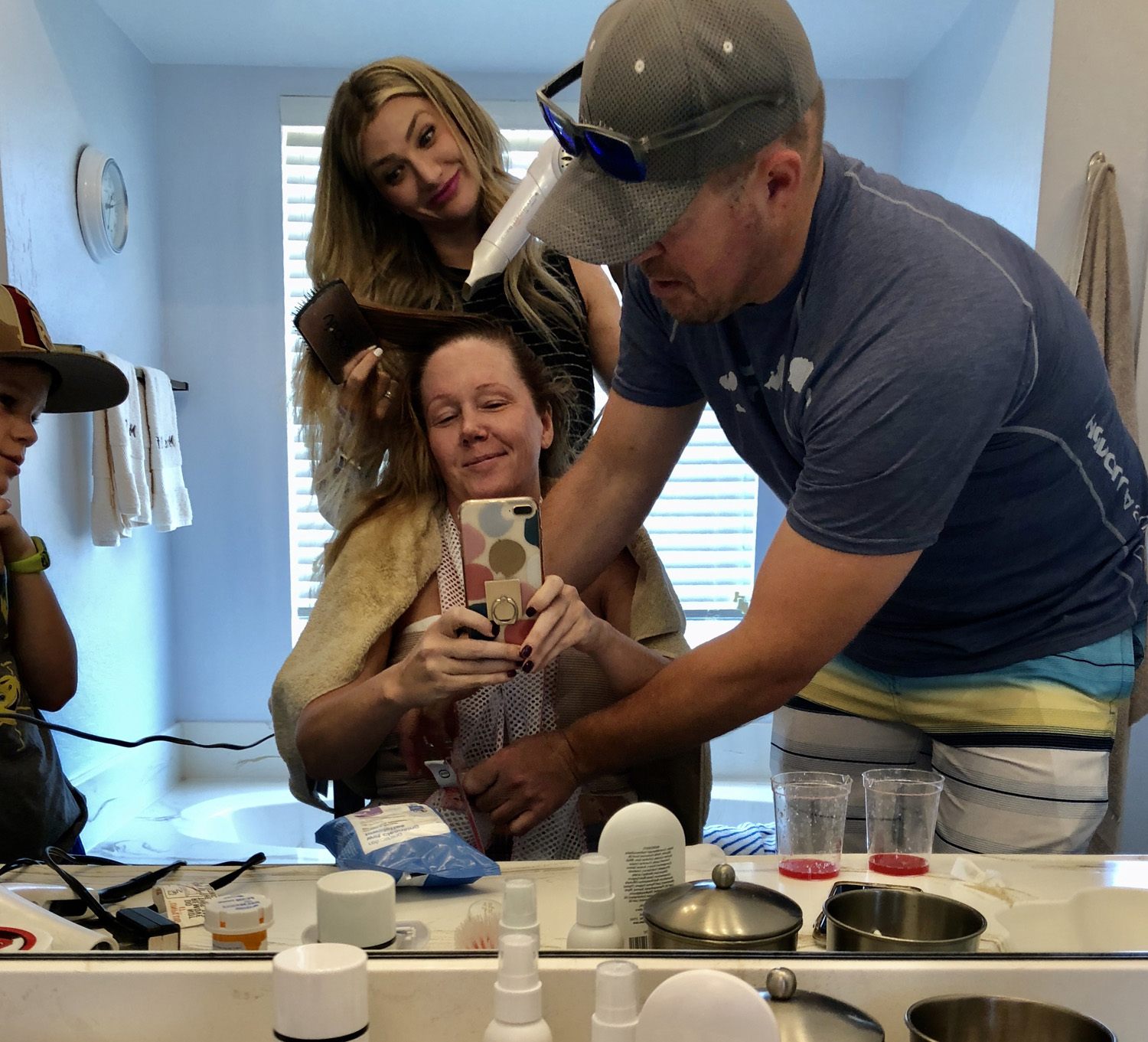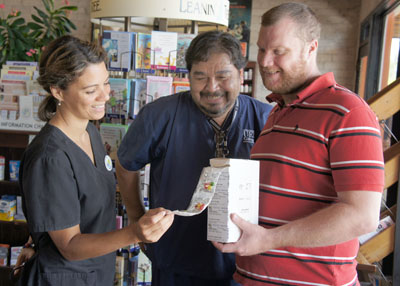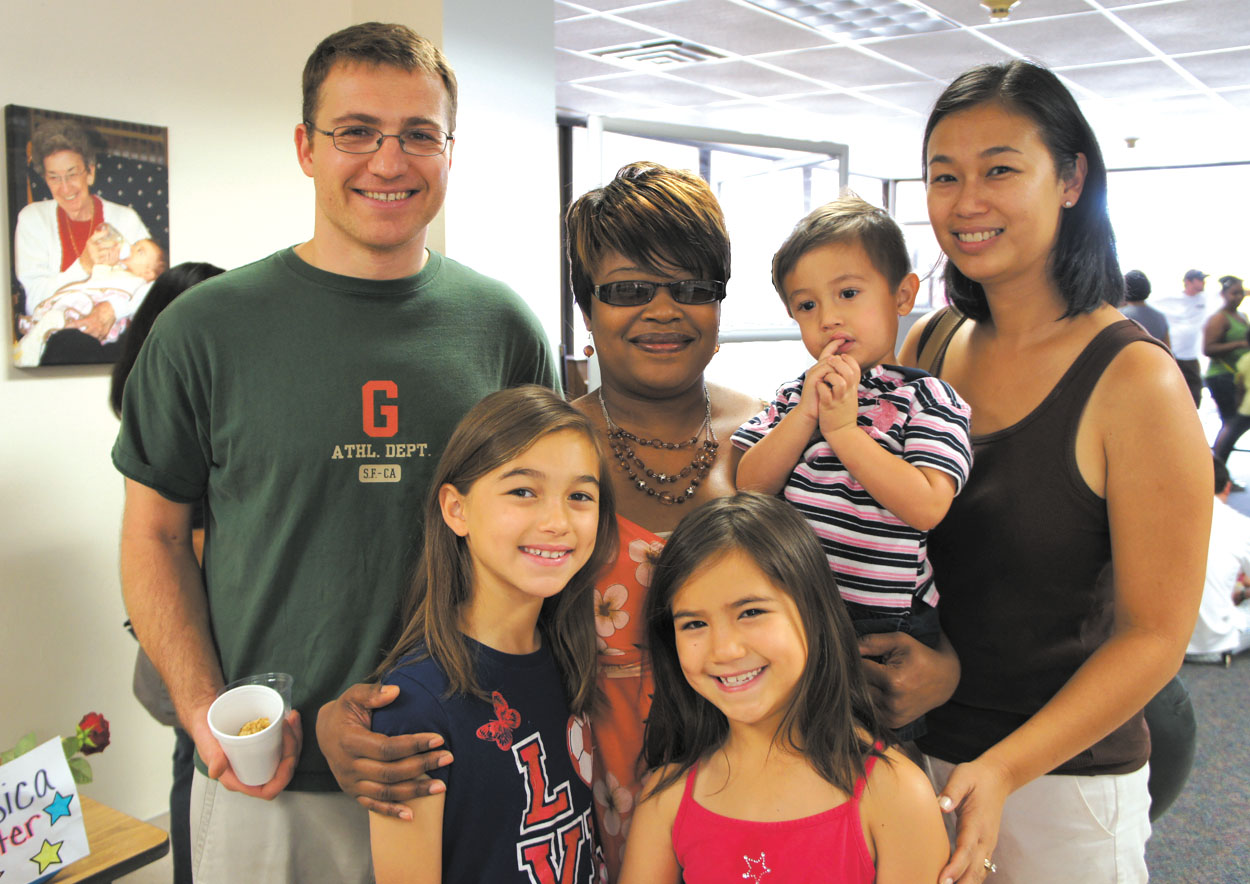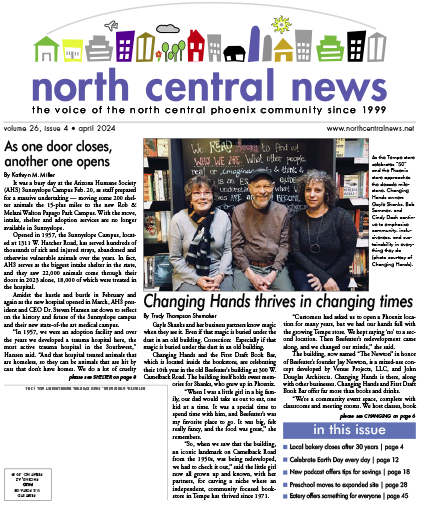It is Breast Cancer Awareness Month, a time to boost awareness of this potentially deadly disease as doctors, survivors and non-profit leaders in North Central fight it every day, providing critical support to those affected by it.
Many medical centers and organizations in the area deliver mammograms, radiation, chemotherapy and surgery, while also providing counseling and support groups, rides to medical appointments and other practical assistance.
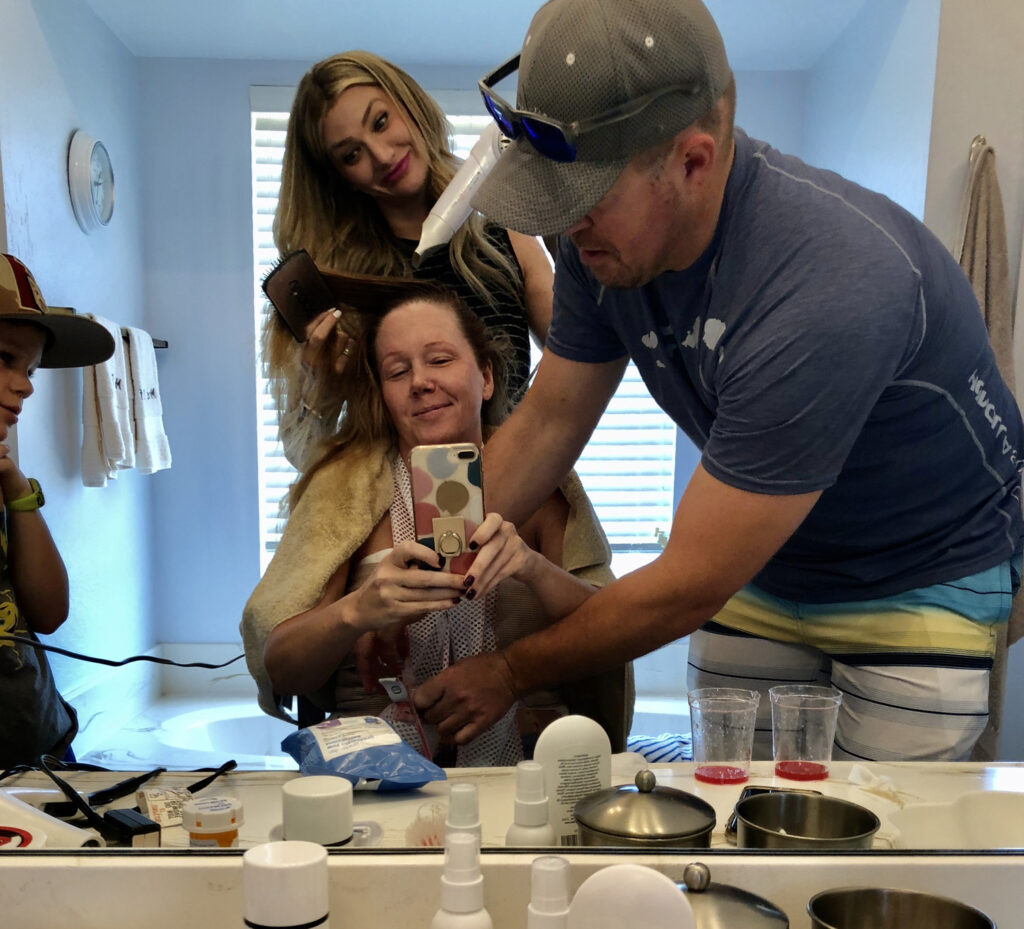
Charlotte Shaff, a North Central resident, mother and owner of The Media Push, recovers after having a bilateral mastectomy, where both breasts are removed, due to breast cancer in 2018. Styling her hair is her friend Kelly Coleman, while her husband, John Shaff, helps her, and their son, Eric, watches (photo courtesy of Charlotte Shaff).
Banner MD Anderson Cancer Center at Banner – University Medical Center at 925 E. McDowell Road, provides comprehensive treatment for patients with breast and other forms of cancer. The other cancer centers are in Sun City and Gilbert.
“My advice is always to take it one step at a time,” said Dr. Vilert Loving, a radiologist and Chief of Breast Imaging for Banner MD Anderson Cancer Center. “There’s a lot of breast cancer survivors out there and a lot of patients actively being treated. That community is very helpful to each other.”
Often the journey starts with a mammogram that detects breast cancer and usually the patient will next meet with a surgeon to determine the best type of surgery. Banner MD Anderson Cancer Center provides integrative oncology, breast imaging, breast cancer surgery, genetic counseling, clinical trials and many other services.
Loving said Banner Health recommends women begin having yearly mammograms at age 40, but if they have a family history of breast cancer they might want to start earlier. He said if someone’s “first-degree” relative, a mother or sister, had breast cancer it indicates that person is “at a higher risk” of contracting it. He said 3-D mammograms are great at capturing pictures of the breast from different angles to help detect breast cancer.
Arizona Oncology, which has a location at the Phoenix – Biltmore Cancer Center at 2222 E. Highland Ave., recently hired breast surgeons Dr. Ronald L. Bauer and Dr. Lise C. Walker, for their Phoenix breast surgical team. Breast surgeon and chief of operations Dr. Edgar D. Staren has also resumed seeing patients in Phoenix.
Bauer said the older someone is, the higher the risk of getting breast cancer. He added if two or more women in someone’s family had breast cancer under age 50 that also increases the risk. Those who have Ashkenazi Jewish heritage also have a higher chance of experiencing breast cancer. Walker said other factors that can increase women’s risk of developing breast cancer include starting their period at a young age and late onset of menopause.
“The main thing is, whatever’s good for your heart is good for your breast,” Bauer said. “Eat lots of fruits and vegetables, exercise, anything you can do to stay lean and thin.”
He said breast cancer surgery has become more conservative in recent years. Many years ago, surgeons would remove the whole impacted breast and muscles “down to ribs,” taking out all the lymph nodes under the arm. Now a lumpectomy, where cancer or other abnormal tissue is removed from the breast, is common.
Dr. Linda Greer, a breast imaging specialist at Abrazo Central Campus, 2000 W. Bethany Home Road, sees the value of early detection for patients. The Breast Health Center at Abrazo Central Campus provides information for patients about the risk of contracting breast cancer, as well as a place to explore treatment options. It also provides 3-D mammography.
Charlotte Shaff, a North Central resident, mother of two boys in the Madison Elementary School District, and owner of The Media Push, had ignored her orders to obtain mammograms for several years despite her husband, John, who is a physician assistant, urging her to get them. She said she felt fine and did not have a family history of breast cancer.
When she was 46 in April of 2018, a mammogram revealed she had breast cancer.
“The first time that I cried was right before I went in for surgery,” Shaff said. “I remember just bawling in my husband’s arms.”
She had a bilateral mastectomy, where both breasts are removed, and later underwent radiation for 33 days. Shaff had a hysterectomy in October of 2018 to try to decrease the risk of cancer returning.
“It’s okay to reach for medication to help you but you also need to surround yourself with positive, uplifting people,” she said.
Coleen McKinstry, senior manager, Community Development for the American Cancer Society in Arizona and a 17-year breast cancer survivor, agreed it is helpful to have loved ones’ support. McKinstry was 41 years old when she was diagnosed.
The American Cancer Society has a phone number people can call 24 hours a day, seven days a week, for information about cancer resources. That number is 800-227-2345. Volunteers from the American Cancer Society drive patients to treatments but that is on hold now due to the pandemic. Usually the American Cancer Society has an annual fundraising walk but because of the Coronavirus crisis, Making Strides Against Breast Cancer will be a vehicle event where participants drive their cars on a fixed route from 7 to 10 a.m. on Oct. 24. To learn more, visit MakingStridesWalk.org/PhoenixAZ.
The Phoenix Cancer Support Network, a non-profit organization, offers transportation to medical appointments, meal deliveries, gas cards, and assistance with fittings for prosthetics, as well as other help.
Jenny Martin, CEO and founder of the organization and a North Central resident, started the organization in honor of her sister, Annie Weber, who died of cancer in 2005.
“We took a horrible situation and we turned it into a resource for people,” Martin said.
To learn more about Phoenix Cancer Support Network, visit pcsnetwork.org.

